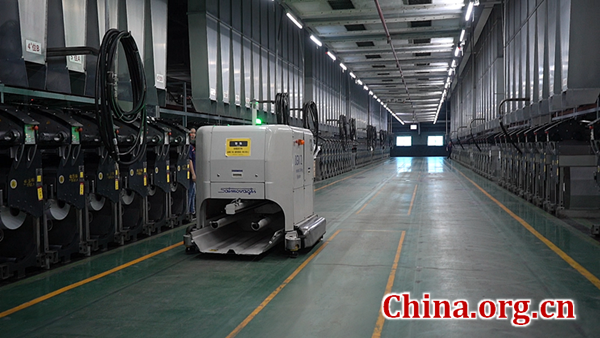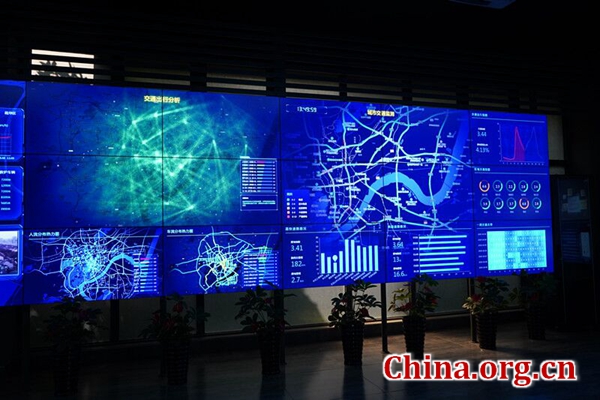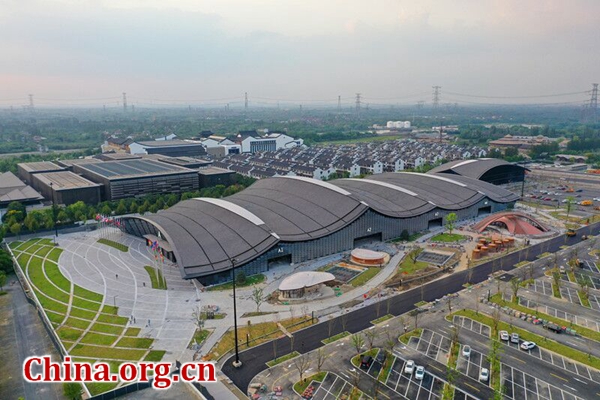WIC host: Its mind-blowing digital economy and achievements
Taking advantage of being the permanent site of the annual World Internet Conference (WIC) Wuzhen Summit, along with other strategic opportunities, Zhejiang province has become a leading force of China's digital economy.

Digitalization of traditional sectors
Digital transformation is now changing the manufacturing industry. The utilization of digital data, robots and other new technologies reduce cost, boost productivity and create safer working environment.
Xinfengming Group, located in Tongxiang City, is one of the leading enterprises in the chemical fiber industry, with its production capacity ranking second in the world. In April this year, it signed a contract with China Mobile to apply the 5G technology in establishing a new "smart factory".
In the new production workshop, there are more than 10 IGVs (Intelligent Guided Vehicles) receiving instructions and transporting spools of chemical fiber to a designated position in a fast and orderly way. The whole process is simultaneously transmitted in 8K ultra-high definition to the company's production dispatch center.
Zhang Hong, a staff member of China Mobile Zhejiang Company, told reporters the 5G network offers larger bandwidth, higher reliability and lower latency, ensuring the efficiency of large-scale data transmission in a short period of time, so that production scheduling is faster and more accurate. "The handling efficiency of the robot (IGV) can be increased by more than 3%," Zhang said.
By building the intelligent manufacturing platform of "5G+Industrial Internet", Xinfengming Group has assumed a new look. There are nearly 13 types, totaling 800 robots, covering almost all the production procedures; the productivity per capita is higher than the industry average of 25%.
The group has also built an industrial internet platform that integrates main data, real-time data, big data, ERP, and auxiliary decision-making and industrial APP, which can realize interconnection of the business and data chains, and cover the entire decision-making process.
The transformation of Xinfengming Group is a microcosm of digital upgrading of Tongxiang's traditional industrial sector. In the first half of this year, the city implemented 579 automation projects, with a total investment of 6.72 billion yuan (US$946.85 million).
By 2022, Zhejiang province is expected to build over 500 digital workshops and smart factories.
Start-ups and high-tech research
Apart from the digitalization of traditional sectors, new tech startups and digital industries focusing on big data, blockchain, artificial intelligence (AI), and robotics are also appearing in Zhejiang province.

"Hangzhou saw 16 unicorn companies emerging in 2018 alone, with a total market value of nearly 200 billion U.S. dollars," deputy director Zhu Chonglie said.
Li Wei, CEO of a high-tech startup, Hangzhou Qulian Technology Co., Ltd, is a "new Hangzhou citizen". He arrived in Hangzhou for high education in 2002. After graduating as a Ph.D. from the school of computer science and technology of Zhejiang University, he settled down in the city.
Having worked for a time in Zhejiang University, Microsoft Asia Research Institute, Zhejiang Information Technology and other companies, he has over 10 years of experience in financial information technology. In 2016, he founded Qulian Technology providing technical products and application solutions of blockchain.
Qulian Technology will participate in the Light of Internet Expo, part of the 6th WIC, and demonstrate their core technologies and products including Hyperchain, a domestic blockchain underlying platform, and Filoop, a Baas Platform. This young company has completed 1.5 billion-yuan (about US$226 million) financing and become the first quasi-unicorn in the blockchain industry.
Li Wei told the reporters that there are those who call blockchain the internet of trust and the internet of next generation, but the public still doesn't have a clear understanding of this technology due to the hype and negative reports of Bitcoin.
"Taking advantage of WIC, an influential global event, I hope we can promote this underlying technology to the public and have more communications with our potential business partners during WIC," Li said.
Speaking about why he chose to start company in the city, Li said Hangzhou had active digital-investment and start-up ecosystems. "The government launched many favorable policies for the Hangzhou High-Tech Zone and gave enough support for startups. Moreover, Zhejiang University and other research institutes serve as talent pools for us," Li added.

Research institutes and labs such as Zhejiang Lab explore the frontiers and the key technologies in intelligent perception, intelligent network, intelligent computing; companies like Enjoyor Co., Ltd focus on building a "city brain" through the Internet of Things, cloud computing, big data, artificial intelligence, to make urban life more convenient.
A large number of research findings and examples of state-of-the-art technology will be displayed at the 6th WIC and some may soon be put into use, contributing to the digital economy development and benefiting people.
The new exhibition hall for the 6th WIC, the Light of Internet Expo Center, is built in the shape of a "silkworm" that is heading forward, which symbolizes that the new technology now in its infancy will grow into "butterflies" from here.

